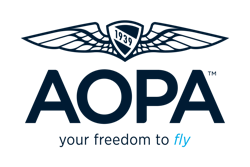AOPA Blasts FAA Flight Training Directive
In light of the recent and short-sighted FAA directive governing flight training for compensation in certain categories of aircraft, AOPA President and CEO Mark Baker sent a strongly worded letter to FAA Administrator Stephen Dickson on July 11, asking the agency to immediately withdraw or delay the rule, which is scheduled to take effect on July 12.
The letter followed a phone call between Baker and Dickson on July 11 and stated: “We urge the FAA to withdraw or invoke an immediate stay of the recent ‘notification of policy’ for flight training in experimental, primary and limited category aircraft. This directive is simply unacceptable to the general aviation community and, together, we will pursue all options available to bring much needed clarity and common sense to this issue.”
The FAA’s notice allowed for no public comment, a process required by the Administrative Procedure Act, Baker noted. He also reminded the agency that it has issued numerous legal interpretations about compensated flight training and operation of an aircraft for compensation, which the FAA chose to ignore.
“The FAA’s stated mission is to ‘provide the safest, most efficient aviation system in the world’,” said Baker. “With this notice, the FAA appears to have made a 180-degree turn on this position, and has placed a bureaucratic hurdle ahead of the need for safety.”
Baker made it clear that the GA community is united and that he has spoken with the leaders of the Experimental Aircraft Association, General Aviation Manufacturers Association, and other GA groups, and that numerous aviation organizations are expected to join in objection to this notice and efforts to correct it.
The directive was also was ill-timed, put in place just two weeks before EAA AirVenture, the world’s largest general aviation fly-in. Many of the owners and pilots of the more than 39,000 registered experimental, limited, and primary category aircraft fly to this airshow, and would be negatively impacted by this bureaucratic exercise that does nothing to enhance safety.
Baker explained that the rule will impose nightmarish administrative requirements on thousands of aircraft owners, pilots, and flight instructors, and simply overwhelm FAA and create even more confusion.
A requirement to complete “a new FAA invoked paperwork process to simply obtain ‘approval’ to do what pilots have already been doing safely for years is simply mindboggling,” Baker added in the letter.
This broad directive, now impacting thousands of aircraft owners, instructors and pilots, arose from a narrowly defined case involving Florida-based Warbird Adventures, and a handful of other very specific cases involving limited category aircraft, a category that includes approximately 400 warbirds.
Despite caution from AOPA and others, the U.S. District Court of Appeals for the District of Columbia Circuit on April 2 allowed an FAA emergency cease-and-desist order to stand against Warbird Adventures, a company that was providing flight instruction in a limited category warbird without an exemption.
As a result of that decision and a request for clarification from the agency regarding its position on flight training for compensation, the FAA on June 4 provided a letter that opined that a flight instructor who receives compensation from a student for providing instruction in a limited category aircraft is acting contrary to federal regulation, even if that compensation is not for carriage or transportation, without an exemption. Furthermore, the FAA’s letter stated that similar prohibitions may extend to an instructor providing flight training in an experimental or primary category aircraft. The general aviation community, including AOPA, reacted negatively to the new characterization of compensated flight training and hurdles to accessing training, and noted the potential impact on tens of thousands of pilots.
The FAA attempted to clarify its position on July 8 with an eight-page “policy” that, among other things, requires owners of experimental aircraft and flight instructors providing flight training in those aircraft to apply electronically for a letter of deviation authority (LODA) “that will permit flight training for compensation in experimental aircraft when no compensation is provided for the use of the aircraft.” Such a rule would put new barriers in place for owners seeking instruction in their own aircraft and discourage flight instructors qualified in various experimental aircraft from providing training, jeopardizing safety.
The FAA directive also puts additional burdens on owners of limited and primary category aircraft, despite the FAA’s previous rulemaking statements such as “it is appropriate to use primary category aircraft” for flight instruction. Bottom line, the rule means that starting July 12, anyone paying for flight instruction in their experimental, limited, or primary category aircraft must have completed the LODA process. While the new “policy” does not affect flight training in standard category aircraft, the change for other categories is seen as a slippery slope that could lead to more changes for those flying typical certified aircraft.
FAA officials have heralded their electronic application process as a simple solution to the issue, but, as Baker pointed out in his conversations with Dickson, it is a solution to a problem the FAA has needlessly created—and one that does nothing to advance the mutual goals of improving safety and reducing barriers to resources that increase pilot proficiency.
